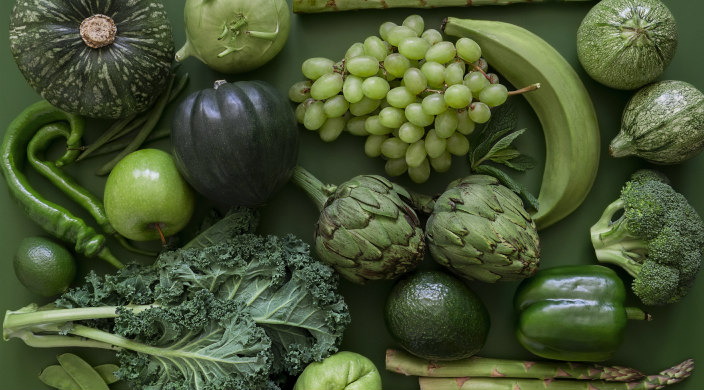
With Passover on the way, many of us are planning festive seder dinners and a week of eating within kosher-for-Passover restrictions. The two main themes of Passover – spring and freedom – go hand in hand with the holiday’s agricultural aspect.
This Passover, celebrate the cycle of time and nature with an approach to food that protects our environment, prioritizes good health, and lines up with Reform Jewish values. For a look at vegan living, we chatted with award-winning chef and author Mark Reinfeld, co-founder of Vegan Fusion.
ReformJudaism.org: What foods are included in a vegan lifestyle?
Chef Mark Reinfeld: A vegan diet is plant-based, which includes a wide array of flavorful and nutritious foods such as fruits, vegetables, herbs, nuts and seeds, legumes, and proteins such as tofu, tempeh, and seitan.
How does eating plant-based foods affect our environment?
It’s one of the most effective actions we can take to help preserve our environment. There’s no better way to go green. Compared to a meat-based diet, a vegan approach reduces water pollution, greenhouse emissions, and land use.
Animal agriculture, the leading cause of deforestation, water consumption, and pollution, is responsible for more greenhouse gases than the transportation industry, and it’s a primary driver of rainforest destruction and species extinction.
How is a vegan lifestyle simpatico with Jewish values?
My passion for the vegan lifestyle is consistent with Jewish teachings – compassion for life, preserving health and the environment, and creating a more peaceful world.
You’ve written that plant-based foods may help people avoid many major illnesses.
We’re at the beginning stages of understanding the impact food choices have on our health. Research studies show that a plant-based diet can help prevent and reverse some of today’s major killers, possibly including heart disease, diabetes, and certain forms of cancer.
People joke about “heavy” Ashkenazi foods, and the nap-inducing lethargy that follows a traditional meal (e.g., dense breads, kugels, shmaltz-laden matzah balls, brisket). How do people feel after a plant-based meal?
You feel satisfied and full after a vegan meal, but there’s a lighter feeling, even with vegan versions of heavy foods. You don’t need a nap afterward. You’re not so bloated or drained, and you can continue with your day feeling energized.
There’s growing support to eat locally grown produce. What’s your perspective?
We need to understand the impact food choices have on our environment. Eating local and organic whenever possible is definitely the way to go; supporting our local farmers and community is a win for everyone.
In your book The Ultimate Age-Defying Plan: The Plant-Based Way to Stay Mentally Sharp and Physically Fit, you offer to “show others just how easy it is to succeed on a plant-based lifestyle.”
With the right tools, people of any age can take their health back into their own hands, and this book offers principles of naturopathic self-care and plant-based nutrition. It was created as a guide to the foods and daily practices needed for optimal health. The book includes more than 175 recipes – all with seven main ingredients or less – to minimize time in the kitchen.
Interested? Try these recipes for a vegan Passover brunch or your seder dinner:
- Tri-Colored Sweet Potato Kugel
- Matzah Encrusted Portobello Mushrooms with Roasted Asparagus and Parsley Pesto
- Sweet Matzah Brei with Cardamom Cashew Crème and Berries
Related Posts

“We Were the Lucky Ones:” Bringing The Holocaust Out of History Books and Into Our Homes

Harnessing the Power of our Mothers Around the Seder Table


